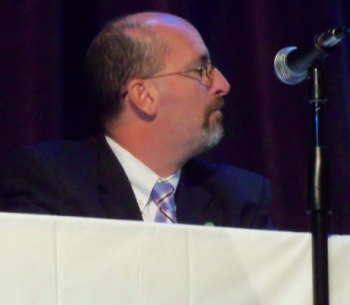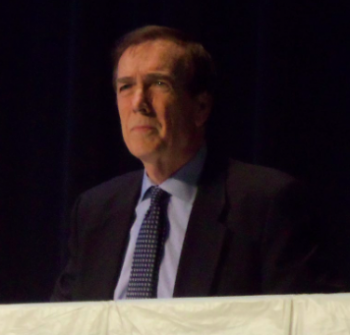10th District Council candidates take subtle swipes during debate

It was about halfway through last night’s 10th District City Council candidate debate when Carol Kessler stood up to ask a question. But this wasn’t an audience participation type of event.
As League of Women Voters President and debate moderator Rachel Lawton explained ahead of the hour-long debate, there’d be no audience questions. Also part of the rules: incumbent Republican candidate Brian O’Neill and Democratic challenger Bill Rubin both had one minute to answer each question and 90 seconds to close their arguments.
Kessler had many questions for the two men, and though she spoke loudly and entered the aisle to make herself heard, Lawton continued with her questions as planned, leaving many of Kessler’s queries unanswered.
O’Neill and Rubin did have answers for Lawton, though some were vague and some were more swipes at each other than they were promotions for their campaigns.
Lawton led with a softie: Why do you live in the 10th District and what are some of its good qualities?
“It’s a great place to raise my family,” Rubin said of the 10th, and features like the backyard and safe neighborhoods remind him of the Wissinoming he grew up in.
“I think it’s a lot better than it was when I got here,” said O’Neill, who’s served eight terms in the 10th. He credits the quality of life in the district to the work he’s done in the last 32 years.
On the city zoning code reforms, their 40 amendments and City Council’s role
Rubin: “I’m not sure what the amendments will be [given the final code hasn’t yet been approved].” The code needs to be business-friendly, he said, calling the Jim Kenney-proposed tax break for news business a “great thing for the city.”
O’Neill: “Parts of the code were devastating [to the Northeast],” he said, repeating what he’s said at civic association meetings around the district over the last few years. He calls many of the changes a “direct result” of his input as a ZCC council representative. As part of a two-part look NEast Philly took at Northeast zoning, O’Neill explained how the code affects neighborhoods in his district.
On fair property assessments and potential property tax changes for residents
Rubin: “We need to see a final plan and move from there.” The city is currently sending assessors around to determine the actual value of properties around the city.
O’Neill: “People can’t have unfair assessments anymore.” O’Neill warns of a backdoor tax, saying he won’t support more taxes to fill the extra $200 million Mayor Michael Nutter calls for in his five-year-plan.
Something about the candidates you might not know
Rubin: “I think kids are the future for our city.” He’s raised his kids, now at Temple University and Archbishop Ryan High School, in the Northeast, and has been an active parent and coach volunteer.
O’Neill: “I agree the kids are the most important.” O’Neill raised his three daughters in the Northeast, says he’s spent countless weekends visiting his toddler grandson in California and calls the Northeast “lucky” to have so many volunteer groups geared toward kids.
On City Council members having city cars
Rubin: “It’s a waste of taxpayer money . . . I will not take one.”
O’Neill: “The policy is set by the administration . . . I need it more than anyone.” O’Neill says the distance of the 10th District from City Hall makes having a city car a sensible use of the policy, but that he’d support a policy change that removes all city employees’ car privileges.
On DROP and the District Council 33 suit
Rubin: DROP is not intended for elected officials and is better designed for police, fire and other city employees.
O’Neill: “My opponent is spreading a lie,” he said, in regards to a Rubin commercial that implies O’Neill is enrolled int he Deferred Retirement Option Plan. “I’m absolutely against it; I’ll never take it.”
The candidates battled a little over this question, going over their allotted answer time and parsing each other’s words. O’Neill referenced a February 2010 NEast Philly video of Rubin, when, in his role with the Pension Board, Rubin explained how DROP works. During the debate, in a commercial and on Facebook, O’Neill calls Rubin a Marge Tartaglione crony.
On the pension fund, city budget and who’s responsible for both
Rubin: “The health of the fund is critical.” He blames O’Neill and the rest of City Council for a plan dating back to the ’80s that padded council members’ pension and benefits plans. He says it’s realistic for the city to have a pension/benefits plan for employees, and says starting and continuing a 401k plan would be more costly.
O’Neill: “I would not put the Pension Board in charge of [the budget].” He admits the city hasn’t done a good job of looking ahead in terms of spending and funding allocation. O’Neill suggested a lower pension/benefits plan for incoming city employees, taking a dig at Rubin before moving on: “I’m no pension expert, but apparently my opponent isn’t, either.”
On growing small businesses
Rubin: “I support that bill 100 percent,” he said again of Kenney’s tax break bill for new businesses.
O’Neill: “You can’t give a break to a company moving in and not to a company already there.” He says he supports legislation from Council members Bill Green and Maria Quinones-Sanchez that, in part, would change the business privilege tax.
Both mentioned a Parkwood resident who’s been unsuccessful in opening a batting cage in the Far Northeast’s industrial hub. Rubin accused O’Neill of standing in the way; O’Neill says he’s trying to move along the zoning variance on the deed-restricted property.
On the value (or not) of a district office
Rubin: “I intend to open a district office.” He suggests City Council move around its hearings and be more accessible for public comment. For his district office, Rubin says he’d have community members available from the growing Russian and Indian cultures in the district.
O’Neill: “I’ve had a district office for three years . . . it’s just fantastic,” he says of the way the office has made him more available to constituents who wouldn’t otherwise seek him out at City Hall.
On City Council president
Rubin: “I will not vote for Marian Tasco.” Though he says he’s focused on his own election and not that of the future president (current president Anna Verna will not seek another term), Rubin says it’s time for a new direction and a new leader.
O’Neill: “It’s not even in the front of my mind.”
On motivation to run for office

Rubin: “I’ve seen what happens when parents, communities take a back seat and don’t get involved. I have a lot to offer this city.”
O’Neill: He says no one knew who the current council person was when he started getting involved in his neighborhood. It propelled him to run and win the election three decades ago.
On whether council members should have outside jobs
Rubin: “Absolutely not.” Citing the $120,000-plus annual salary and the high demands, Rubin says there’s no reason the council job shouldn’t be the N0. 1 focus.
O’Neill: “[Rubin] is a triple-dipper,” he says of his opponent’s job with the pension board and ties as a paid consultant to unions and a City Avenue company.
On making budgets public
Rubin: “[Council budgets] should be scrutinized like every other budget.”
O’Neill: “The more public, the more transparent the better.” He says he’d support making district budgets public, and that salaries in his district office are a matter of public record.
On education

Rubin: “Opportunities for our grade schools and middle schools are excellent. High schools need a lot of work.” He says it’ll take more than a four-year council term to fully correct the problems schools have had for years.
O’Neill: “I like the idea of what New York did,” he says of the city’s smaller community-based districts. He cites Stephen Decatur School on Academy Road, which he says has achieved higher test scores since becoming a neighborhood school and seeing more parental involvement.
On public/private partnership opportunities
Rubin: The are “absolutely” opportunities, like the Flyers Skate Zone on Decatur Road. He says the obstacle is making the deal appealing to businesses.
O’Neill: “We have some good partnerships here.” As an example, he says, Franklin Mills Mall has worked with 10 different organizations in the area.
On whether city employees should live in the city
Rubin: “Yes.”
O’Neill: Yes, if you’re not a police officer, since most other cities allow officers to live elsewhere.
One hour and more than a dozen questions later, Rubin and O’Neill were given 90 seconds for a closing statement. Based on the coin toss before the debate, Rubin answered the questions first and O’Neill closed first.
The incumbent used his final statement to thank his friends, families and constituents, as well as the debate host and organizers. Rubin, who did the same, slipped in one last jab: “[Constituents] have seen more service in the last 10 months than they’ve seen in the last 10 years.”
Kessler, still fired up after her mid-debate interjection, sought out both candidates and their staffers for more answers, answers she says should have been part of the debate: candidates’ thoughts on judges, ballot questions, trade school opportunities and crime.
An hour wasn’t enough for some, but O’Neill thought all went well, considering it’s his first debate in his 32 years of office. He explained to NEast Philly as the crowd cleared out: “I thought it was civil and hopefully informative.”
The debate was hosted by JCC Klein, moderated by the League of Women voters and organized by the Committee of Seventy, the Philadelphia Inquirer, Philadelphia Daily News, Philly.com, the Philadelphia Tribune, Al Dia and WHYY/NewsWorks.
WHYY is your source for fact-based, in-depth journalism and information. As a nonprofit organization, we rely on financial support from readers like you. Please give today.




